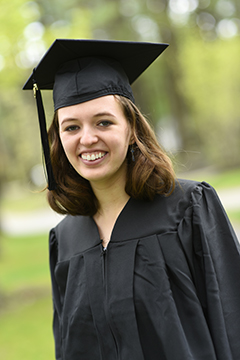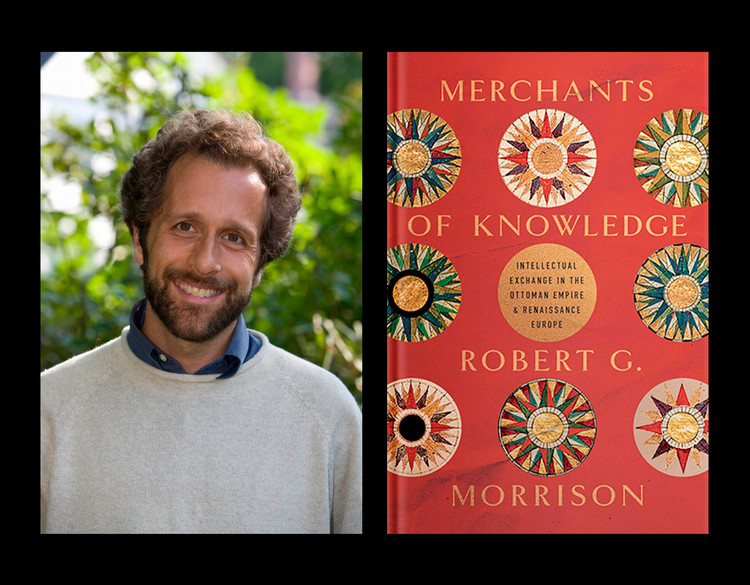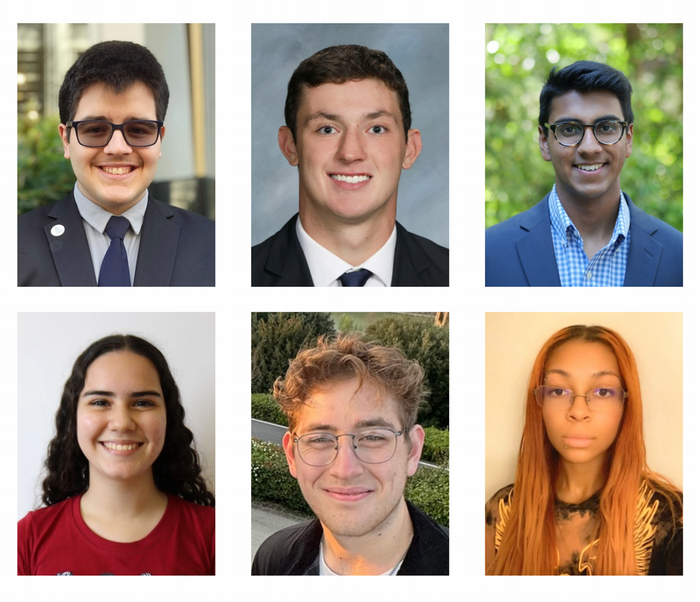Commencement 2017 Student Speaker: Starling Irving '17
By Doug CookClass of 1868 Prize Winner Starling Irving '17 delivered the address "The Cosmic Lottery" at Bowdoin's 212th Commencement May 27, 2017.
President Rose, Members of the College, and Guests,
There are over twenty-two thousand living people who attended Bowdoin. This means that there are over twenty-two thousand versions of this place that exist in the minds of people who spent time living in this beautiful physical location. Every person who attends Bowdoin experiences it in a different way. Every graduate, every name on every plaque and every face in every team photo and every person that has ever lived in the dorm rooms that we lived in until today, holds a different Bowdoin story and a different definition of this place.

A sociology major who grew up in St. John, New Brunswick, Starling Irving is one of those rare people who still uses a typewriter — Royal typewriters, to be specific. One from the ’30s and one from the ’50s And she takes pictures with a 35-millimeter film camera.
This spring, for an independent study, she used those typewriters to write a series of short stories, each one about a moment when her perspective shifted in some way.
She will put together 10 of these stories in a book with photographs she developed in a dark room. She says she uses these old devices because they make her more deliberate — both with the words she chooses and the photos she takes.
Starling has also made it a habit to listen to the voiceless. Last fall, for another independent study, she spent time at a Maine jail, speaking with an inmate during visitation hours and writing down his stories.
This experience followed a project in which she interviewed teenagers at a juvenile detention center to collect their stories as well.
Starling has also launched an ambitious long-term project: she has videotaped sixteen of her closest friends talking about their lives.
She plans to visit these friends every five years to videotape them up to their 25th Bowdoin reunion. Which will be in 2042.
In June, Starling and her sister Rein will convert their 1959 Chevrolet bus into a mobile vintage clothing shop called Stillwater Vintage. Then they’ll travel around New England, selling clothes.[/callout]
I was born and raised in Canada. My connection to Maine began when my family started spending summers in Orland, a small town a few hours from here. Our cottage is tucked away deep down a narrow winding dirt driveway in the middle of the woods. The house is wedged between a granite cliff and the crystal-clear water of Craig Pond. It is so secluded that we can jump into the lake wearing old dresses we bought at the town thrift shop or scream the lyrics to Barry Manilow songs while doing the dishes and nobody knows.
There is no wifi or cell service so at night we either make s’mores or listen to each other play piano or we pick out a movie from the drawer of DVDs in the basement. There is a limited selection of movie options in that DVD drawer. There’s Finding Nemoof course, and there are a few Jim Carrey movies, and then there are five DVD copies of The Big Chill.
For those who aren’t familiar with The Big Chill, it is a 1983 film about a group of college friends who reunite after the death of one of their friends fifteen years after graduation. The DVD has been gifted to my family many times because of its striking similarity to the reunion that takes place at our cottage each summer.
My mother went to Bowdoin but in her Bowdoin story, the building that is now the Admissions Office was her fraternity and in that fraternity lived a student named Mark Preece. His name might sound familiar, as it is the name on a field house plaque marking the height he holds the record for on the Bowdoin high jump at six feet and ten-and-a-half inches. Mark Preece was known as Preecey by his friends, and also happened to be Canadian.
Fifteen years after his graduation he knew he was about to lose his battle with melanoma. A few weeks before he died, there was a dinner for him in Hamilton, Ontario where he lived. Thirty-two of his Bowdoin friends shared one last meal with Preecey to say goodbye. They all met up in the back room of a restaurant while a babysitter stayed home with Preecey’s twin baby boys, who are now my age.
Preecey’s face was a little more sunken than usual but he spent that dinner like his old self, making jokes and sharing funny stories. The night wore on and eventually Preecey announced that he was tired and just needed to go home. He said goodbye and as he walked out the door, his Bowdoin classmates realized that it was the last time they would ever see him.
The tears of laughter from the stories shared throughout the night abruptly turned to sobs. They held onto each other, crying into their arms on the table and trying to catch their breath. Twenty minutes later, there was the sound of a fork beginning to scrape away at dinner again. And then more forks. And then the crying stopped. And soon enough, all thirty-two of them were sharing stories about Preecey again. They talked about the dance he’d do on top of the fraternity radiator to Earth Wind and Fire and they talked about how he’d gone to visit every single one of them even before he knew he was sick.
They stayed up until four in the morning together telling stories about their Bowdoin friend Preecey. Every summer since then, those thirty-two Bowdoin friends come to Maine from all over and tell those same stories and through their stories, they keep Preecey’s Bowdoin story alive.
Before graduating from high school, my Natural History professor told us to put away our notebooks and just listen because he had some advice for us about how to make the most of our college experience. He went through a list of things that he wished he had been told before he went to college. The list included things such as not letting substances define your time at college and recognizing that your professors are also people and making an active effort to get to know who those people are.
The final piece of advice was this: “Be modest about the experiences you have as a direct result of winning the cosmic lottery.” I’ll say that one more time. “Be modest about the experiences you have as a direct result of winning the cosmic lottery.” He told us that it was true that we were special and unique but that our uniqueness did not mean we were any more deserving of our life experiences than anyone else.
He said there was an infinite number of actions and reactions that took place that landed us in the exact place we were at any given moment. He told us that there was a finite limit on the number of actions and reactions that we had any control over.
When I received my Bowdoin acceptance letter, I cried. It wasn’t even a happy cry. I cried because I had just won my cosmic lottery jackpot and I could not figure out why. Every Bowdoin student I had ever met had cited their decision to attend Bowdoin as the best decision of their life and I was crying because I would never know what made me worthy to be offered the opportunity. I called my dad and explained through tears that I could not imagine being happy at a place if I thought I had been accepted on grounds other than my individual merit.
Instead of trying to convince me that there could not possibly be other factors in my acceptance, he said, “You’ll never know why you got into Bowdoin; there are a million different factors. So instead of figuring out if you’re the most deserving person to receive that letter, go there and prove to yourself that you should be there. Winning the cosmic lottery is not just about the opportunities you have been given. It’s about what you make of those opportunities.”
I spent four years trying to figure out exactly what would prove to myself that I was worthy of that Bowdoin acceptance letter. Today, as I stand here about to leave this school, there are no plaques with my name on them, which means that after I leave, my name won’t even have the ring of familiarity that Mark Preece’s does for holding the high jump record. But if there is one thing that I have learned from the legacy of the stories about Mark Preece told at our family cottage every summer, it is that our value reaches its full potential through the connections we make with the people whose stories overlapped with ours during our brief four years living on this campus.
Despite how incredible our dining hall food is, I have learned that the best part of every meal is the conversation and the company. I have learned that studying an hour less for a Psychology exam is worth it if it means you make time for a late-night drive to Lands End with friends to watch the aurora borealis.
What I’ve learned in Bowdoin classrooms is invaluable. But what has set Bowdoin apart for me, is the opportunity it has given me to truly connect with the people whose lives intersected with mine the day our Bowdoin stories began. The people we stop to say hi to in the halls of Smith Union are the people that we might end up working with or might inspire some future research we do. Maybe one of them might convince us to try yoga or maybe we’ll end up marrying one of them.
Regardless of the impact each of these people has had on us, each interaction is an intersection that intertwines our Bowdoin stories. Preecey seemed to understand that these points of intersection were cosmic miracles. The side effect of seeing the best in everyone and making time for each of them was an inadvertent legacy that lives through the stories that are still told about him today.
This past fall a group of my Bowdoin friends drove a few hours away to my family’s cottage to spend the weekend off campus together reflecting on our senior fall, the beginning of the end. We cooked together while dancing to Marvin Gaye, The Temptations, and other Big Chillsoundtrack stars.
A little past midnight we all decided to brave the chilly Maine air and walk down to the lake to jump in. Shivering in our towels we approached the still body of water, which looked like a dark sheet of glass. It was one of those nights where all the stars in the universe seem to come out of hiding, illuminating the sky like fireflies. And then there was a second sky: the one reflected in the water. The transition between the stars in the sky and the reflection of the stars in the water was seamless.
True to a tradition my father started at the cottage, we spent one full minute in absolute silence looking at the stars. And then we jumped in. There, swimming in the middle of the universe, I felt overwhelmingly grateful for all the trillions of actions and reactions that led me to be in that exact place at that exact time with those exact people. It was among the stars, with each of our Bowdoin stories intertwining, that I knew for sure that I had won the cosmic lottery.



